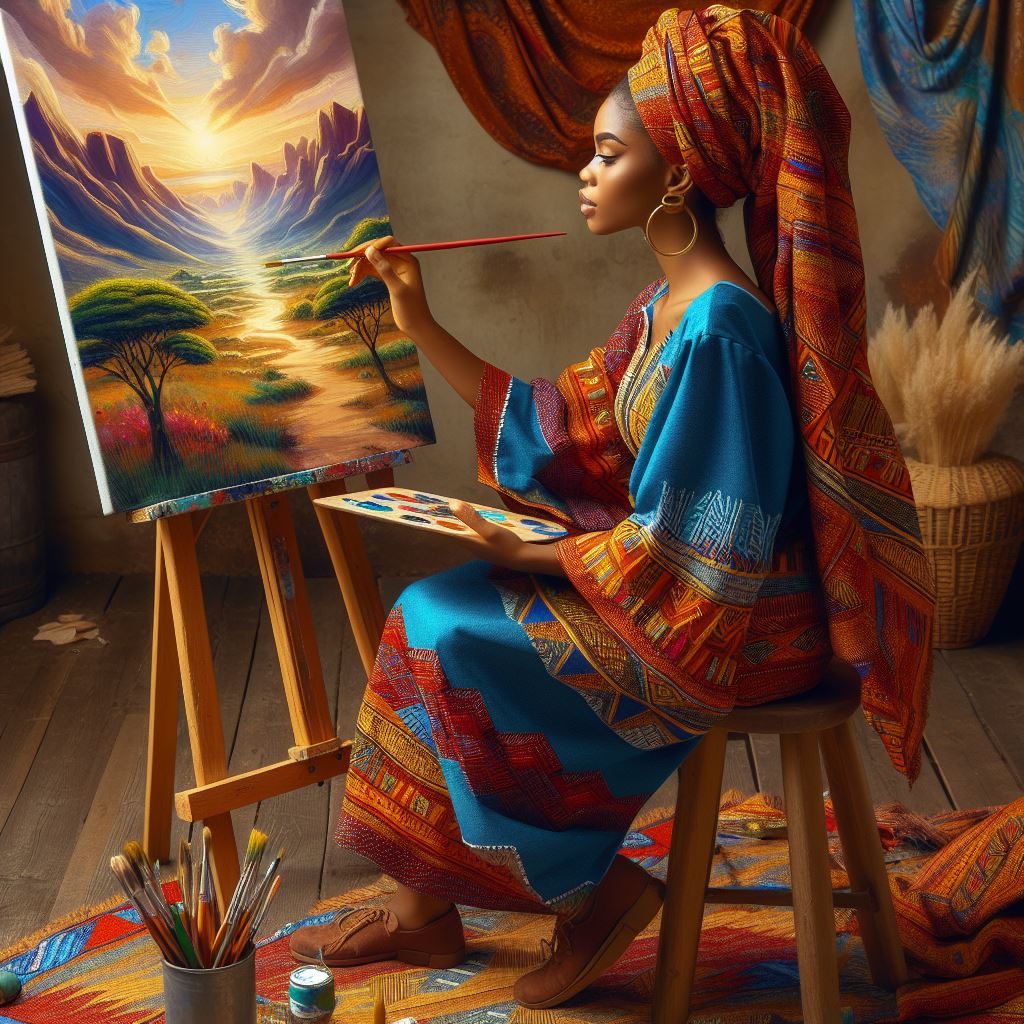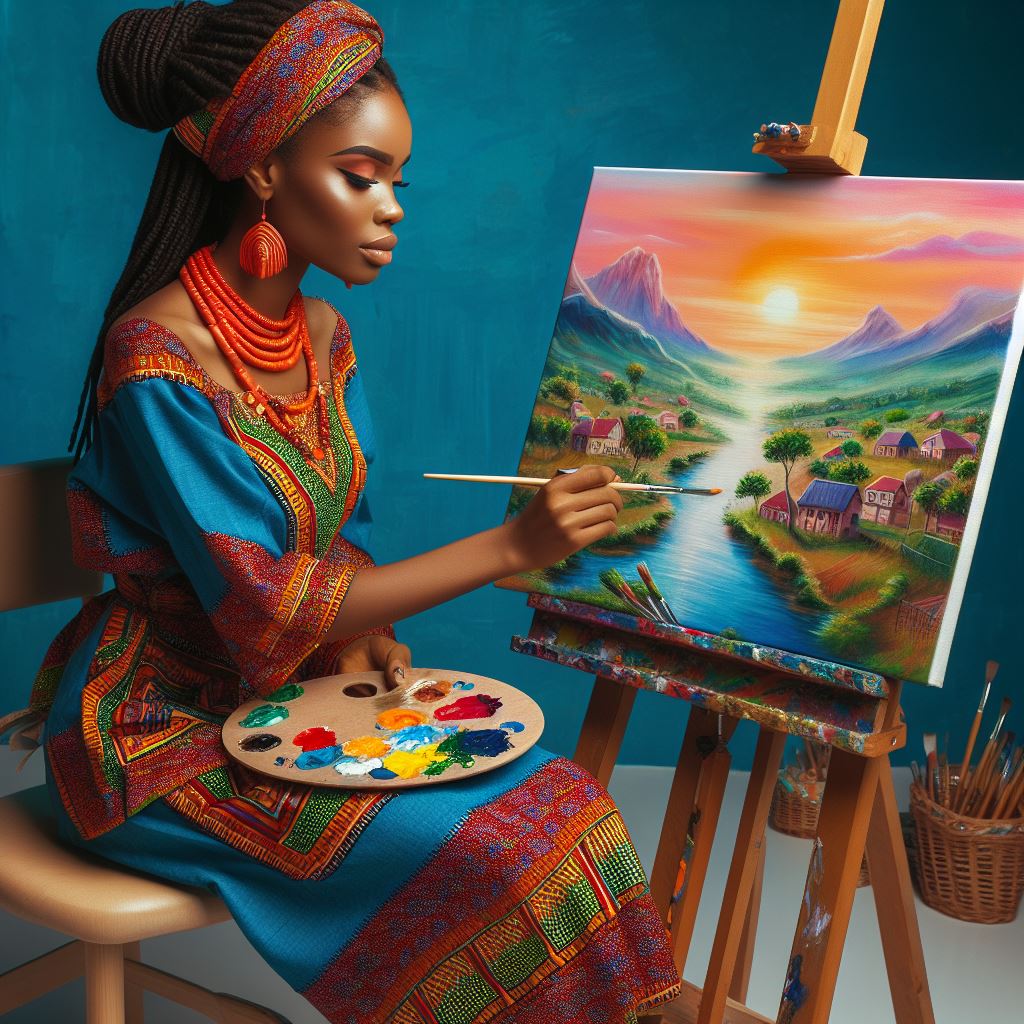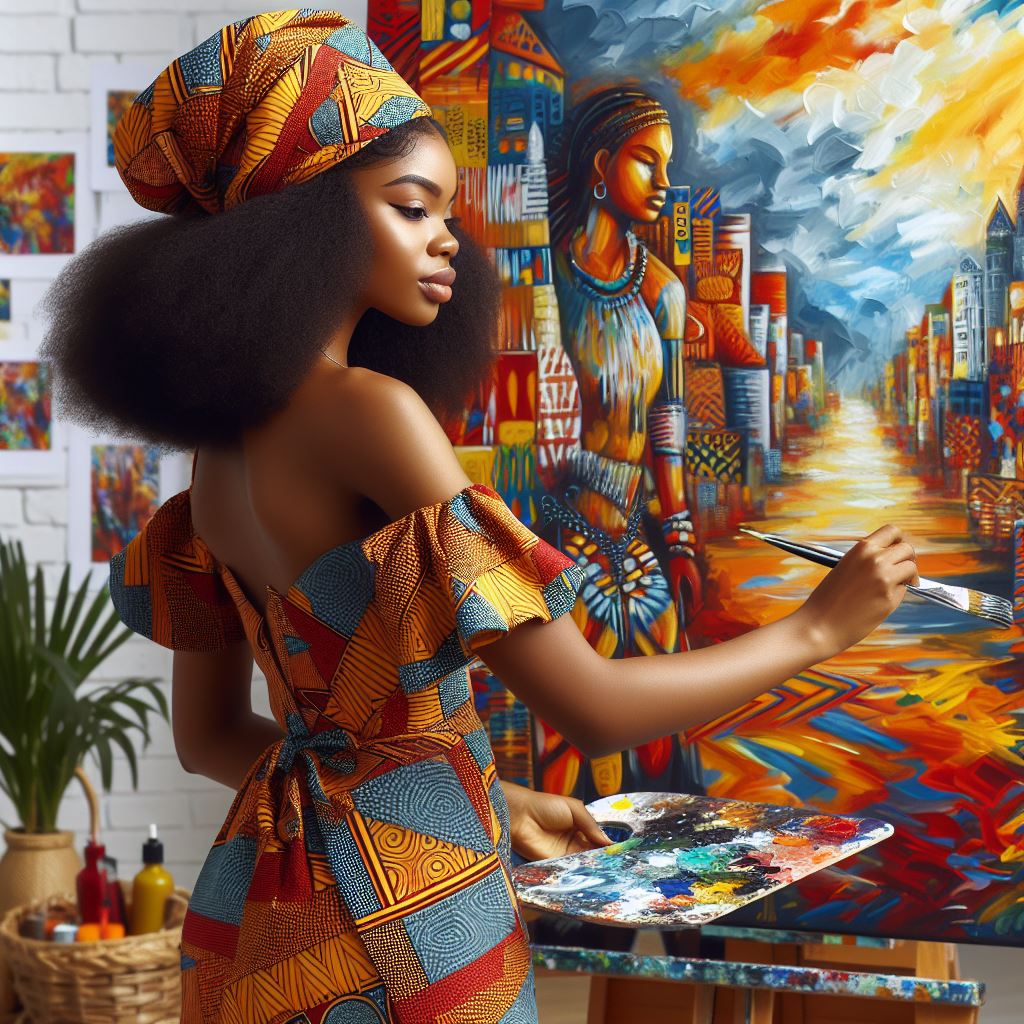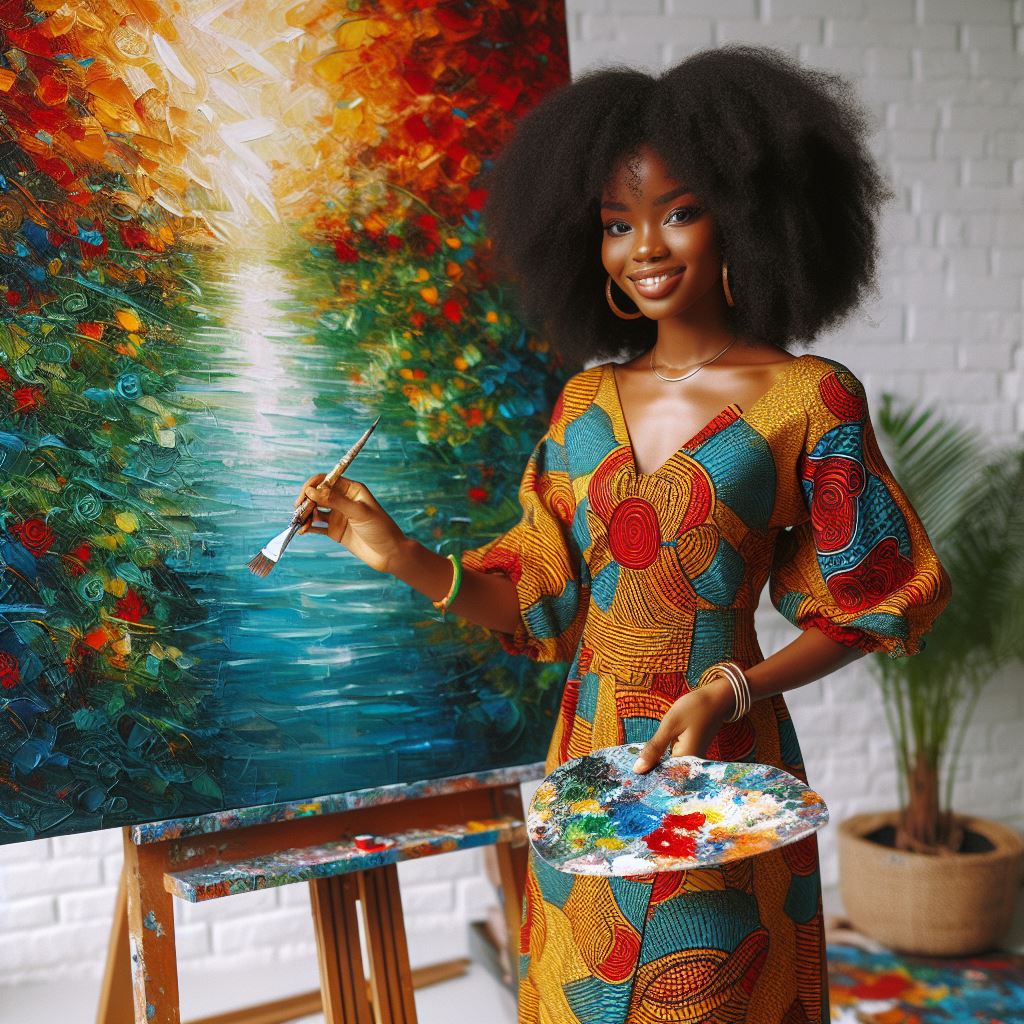Introduction
Welcome to the captivating world of Nigerian art festivals and events, where creativity knows no bounds and cultural vibrancy reigns supreme.
These dynamic gatherings serve as vibrant celebrations of Nigeria’s diverse artistic landscape, bringing together artists, enthusiasts, and connoisseurs from far and wide.
Highlighting the Importance
These cultural events hold immense significance in the promotion and preservation of Nigerian art.
By providing a platform for artists to exhibit their works, they amplify the voices of Nigerian creatives and showcase the nation’s rich artistic heritage to the world.
Moreover, these events foster meaningful connections between artists and art enthusiasts, sparking dialogue, collaboration, and innovation within the artistic community.
Nurturing Artistic Connections
Through exhibitions, workshops, and interactive sessions, Nigerian art festivals and events create opportunities for artists to network, share ideas, and learn from one another.
They serve as catalysts for creativity, inspiring both established artists and emerging talents to push the boundaries of their craft.
Driving Cultural Exchange
Beyond their role in promoting Nigerian art, these events also facilitate cultural exchange by welcoming participants from diverse backgrounds.
By embracing different perspectives and experiences, they enrich the artistic discourse and foster greater understanding and appreciation of Nigeria’s cultural heritage.
As we embark on this journey through the Nigerian art festivals and events calendar, let us celebrate the power of creativity to unite and inspire, and the transformative impact of art on society.
Major Nigerian Art Festivals
Some of the most popular and significant art festivals in Nigeria
Nigeria’s vibrant cultural scene is punctuated by a myriad of significant art festivals, each with its own rich history and purpose.
Details on the history, purpose, and activities of each festival
The Lagos International Art Festival stands as a beacon of contemporary expression, drawing artists and enthusiasts globally.
Rooted in ancient history, the Benin Heritage Festival honors the legacy of the esteemed Benin Kingdom.
The Igbo Arts and Culture Festival serves as a vibrant tapestry of Igbo traditions, celebrating their rich heritage.
In the north, the Kano Durbar showcases the majestic traditions of the Hausa people through colorful parades.
The Osun-Osogbo Festival, steeped in Yoruba spirituality, venerates the river goddess Osun with elaborate rituals and processions.
Calabar’s Carnival, a dazzling display of creativity, attracts visitors worldwide with its vibrant street parades and performances.
The Oloibiri Art and Cultural Festival sheds light on the Niger Delta’s rich cultural heritage amidst environmental challenges.
In the east, the New Yam Festival symbolizes prosperity and community unity, marking the harvest season with joyous celebrations.
Meanwhile, the Ogun Festival in Ogun State pays homage to the god of iron and warfare, featuring ritual performances and ceremonies.
Each festival serves a unique purpose, from promoting cultural exchange to fostering tourism and preserving traditional values.
The Lagos International Art Festival provides a platform for contemporary artists to showcase their works globally.
The Benin Heritage Festival celebrates the kingdom’s history while stimulating economic growth and tourism in the region.
The Igbo Arts and Culture Festival fosters unity and pride among Igbo communities while preserving their cultural heritage.
The Kano Durbar, with its elaborate displays of horsemanship and regalia, reinforces cultural identity and tradition among the Hausa people.
Similarly, the Osun-Osogbo Festival strengthens spiritual connections to Yoruba beliefs while attracting pilgrims and tourists.
Calabar’s Carnival, known as Africa’s biggest street party, boosts tourism and showcases Nigeria’s cultural diversity and creativity.
The Oloibiri Art and Cultural Festival raises awareness of the Niger Delta’s heritage and environmental issues, fostering community engagement.
Read: Language Arts Courses: What to Expect in Nigeria
Regional Art Events
When it comes to art events in Nigeria, each region has its unique offerings that showcase the diversity of Nigerian art and cultural heritage.
From the north to the south, here are some of the regional art events that celebrate specific cultural traditions and art forms:
Art events that are specific to different regions in Nigeria
Nigeria’s rich cultural tapestry unfolds through a myriad of art festivals, each pulsating with unique regional flavors.
In the bustling city of Lagos, the Lagos International Art Festival ignites creative sparks annually.
The diversity of Nigerian art by showcasing events that celebrate specific cultural traditions and art forms
Traditional art forms take center stage in Benin during the Benin Heritage Festival.
The Igbo Arts and Culture Festival showcases vibrant Igbo heritage in the southeast.
Northern Nigeria hosts the Kano Durbar, displaying horse-riding prowess and traditional regalia.
The Osun-Osogbo Festival in southwestern Nigeria celebrates the convergence of art, culture, and spirituality.
Calabar’s Carnival blends art with pageantry, offering a mesmerizing spectacle of color and creativity.
The Oloibiri Art and Cultural Festival in the Niger Delta pays homage to the region’s oil-rich heritage.
The New Yam Festival in the eastern region celebrates the harvest season with elaborate artistry.
Ogun Festival in Ogun State showcases the resilience and cultural pride of the Yoruba people.
Attendees immerse themselves in artistic expression, from intricate sculptures to dynamic performances.
These festivals provide a platform for local artists to showcase their talents and preserve cultural legacies.
Visitors enjoy a sensory feast as Nigeria’s sights, sounds, and flavors come alive in vibrant displays.
The elaborate beadwork of the Yoruba and intricate wood carvings of the Igbo highlight each region’s distinct artistic heritage.
Through these festivals, Nigeria celebrates its artistic prowess, the resilience of its people, and the richness of its heritage.
In a homogenized world, these festivals stand as beacons of cultural authenticity and pride.
They remind us to preserve and cherish our cultural heritage for future generations.
In Nigeria, art transcends aesthetics; it is a testament to the nation’s soul.
Whether captivated by rhythmic drumbeats or intricate traditional attire, Nigerian art festivals offer a unique experience.
Read: Exploring Semiotics in Communication Arts
Emerging Art Festivals
As the Nigerian art scene continues to evolve and expand, there are several emerging art festivals that are gaining recognition for their unique offerings and fresh perspectives.
These festivals provide a platform for both established and upcoming artists to showcase their talents and contribute to the vibrant cultural landscape of Nigeria.
New and upcoming art festivals that are gaining recognition in the Nigerian art scene
Nigeria’s dynamic art landscape continues to evolve with the emergence of new and exciting festivals, each carving its niche.
The unique features and offerings of these festivals that set them apart from more established events
The Abuja Art Fair, a rising star, showcases contemporary art in Nigeria’s capital, attracting both local and international talent.
In Port Harcourt, the Rivers State Art Festival celebrates the region’s cultural diversity with a focus on emerging artists.
The Enugu Art Expo is gaining traction for its innovative approach, blending traditional art forms with modern interpretations.
Nestled in the serene town of Osogbo, the Osun Art Festival offers a platform for emerging artists to shine amidst ancient traditions.
The Kaduna Creative Arts Festival spotlights Northern talent, providing a platform for artists from the region to showcase their work.
Each of these festivals brings a fresh perspective to the Nigerian art scene, offering unique opportunities for both artists and audiences.
The Abuja Art Fair stands out for its focus on contemporary art, providing a space for artists to explore new concepts and techniques.
Meanwhile, the Rivers State Art Festival embraces diversity, showcasing a wide range of artistic styles and cultural influences.
The Enugu Art Expo sets itself apart with its fusion of traditional and modern art, attracting audiences from across the country.
The Osun Art Festival, rooted in tradition, offers a unique blend of ancient rituals and contemporary artistic expression.
Finally, the Kaduna Creative Arts Festival shines a spotlight on Northern talent, bridging cultural divides and fostering collaboration.
As these festivals continue to gain recognition, they contribute to the growth and diversity of Nigeria’s vibrant art scene.
They provide platforms for emerging artists to showcase their talents, while also offering audiences fresh perspectives and new experiences.
Generally, while established art festivals in Nigeria hold a special place in the country’s cultural landscape, the rise of new and upcoming events adds exciting dimensions to the scene, ensuring its continued evolution and vitality.
Read: Developing Critical Thinking in Language Arts
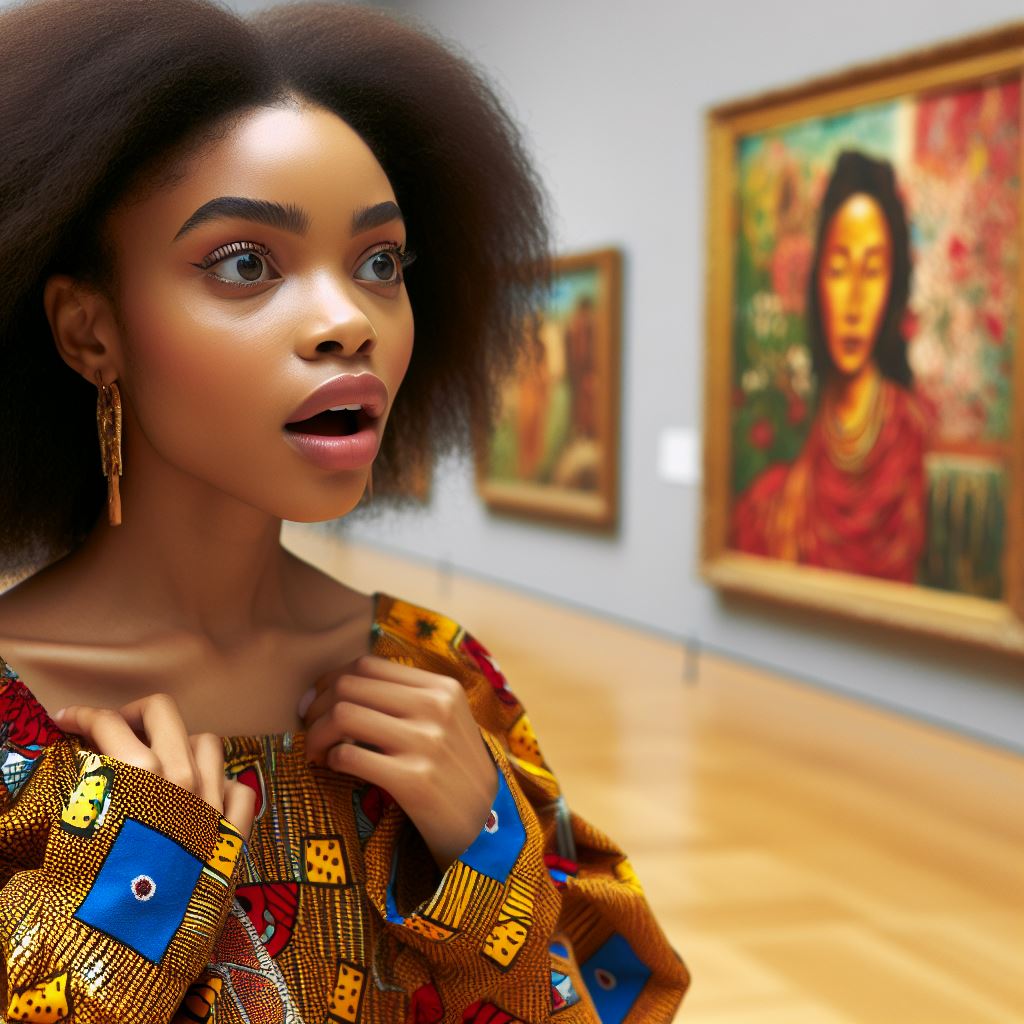
Art Workshops and Seminars
Art workshops and seminars play a crucial role in art festivals and events, offering artists invaluable opportunities for growth and development.
Artists from various backgrounds and disciplines come together to participate in these educational programs, gaining new insights, techniques, and perspectives.
Workshops and seminars that are organized as part of art festivals and events
Art festivals in Nigeria go beyond mere exhibitions; they serve as platforms for immersive workshops and enlightening seminars.
The importance of these educational opportunities in fostering creativity and skill development among artists
Workshops cover a broad spectrum, from traditional art techniques to digital innovations, catering to diverse artistic interests.
Seminars delve into critical topics like art history, cultural preservation, and the intersection of art and society, fostering intellectual discourse.
These educational opportunities provide artists with invaluable insights, helping them refine their craft and expand their artistic horizons.
By learning from seasoned professionals and engaging with fellow artists, participants gain new perspectives and innovative approaches to their work.
Furthermore, workshops and seminars encourage collaboration and networking, fostering a sense of community within the artistic realm.
For emerging artists, these opportunities are particularly crucial, offering mentorship and guidance as they navigate the competitive art world.
Moreover, the interactive nature of workshops allows for hands-on learning, enabling artists to experiment with new techniques and mediums.
Through these educational initiatives, art festivals empower artists to push the boundaries of their creativity and pursue artistic excellence.
Transform Your Career with Expert Guidance
Get personalized mentorship consulting that’s tailored to your unique path. Our expert advice is actionable and exclusive.
Get StartedUltimately, the impact of workshops and seminars extends far beyond the duration of the festival, leaving a lasting impression on participants’ artistic journeys.
Therefore, workshops and seminars play a pivotal role in nurturing creativity and skill development among artists, ensuring the continued growth and vitality of Nigeria’s vibrant art scene.
Read: Student Experiences: Life in Communication Arts
Uncover the Details: Mass Communication Degree: Pros and Cons Nigeria
Gain More Insights: Top Nigerian Universities for History & Strategic Studies
Uncover the Details: Technological Innovations in Islamic Studies
You Might Also Like: Introduction to Anthropology: Basics and Importance
Virtual Art Festivals
The impact of the COVID-19 pandemic on art festivals and events in Nigeria
The COVID-19 pandemic has reshaped Nigeria’s art festivals, presenting unprecedented challenges and opportunities alike.
Festivals faced cancellations, postponements, and restrictions, disrupting the traditional avenues for artists to showcase their work.
In response, many organizers embraced virtual platforms, pioneering innovative ways to connect artists with audiences remotely.
Virtual festivals and online platforms that have provided opportunities for artists to showcase their work and engage with audiences remotely
Virtual festivals emerged as a lifeline, offering artists a digital stage to exhibit their creations and engage with viewers worldwide.
Platforms like “ArtFest Nigeria Online” and “Virtual Art Expo” provided opportunities for artists to showcase their talents.
Through live streams, virtual galleries, and interactive exhibitions, artists transcended physical barriers to reach global audiences.
Online workshops and seminars flourished, fostering skill development and artistic exchange in a virtual landscape.
Despite the challenges, the pandemic spurred creativity, prompting artists to explore new mediums and adapt to digital platforms.
Virtual festivals also democratized access to art, making it more inclusive and accessible to diverse audiences.
However, the shift to virtual platforms posed its own set of challenges, including technical limitations and digital divide issues.
Some artists struggled to adapt to the digital realm, lacking access to necessary resources or technical expertise.
Moreover, the absence of physical interaction and communal experiences dampened the spirit of traditional festivals.
Yet, virtual festivals offered a silver lining, paving the way for hybrid models that blend digital innovation with in-person experiences.
As the world navigates the ongoing uncertainties of the pandemic, Nigerian art festivals continue to evolve and adapt.
Organizers are exploring hybrid formats that combine virtual components with limited in-person events, striking a balance between safety and artistic expression.
In general, while the COVID-19 pandemic disrupted Nigeria’s art festival landscape, it also catalyzed digital transformation and innovation.
Virtual festivals and online platforms have provided vital opportunities for artists to showcase their work and connect with audiences in unprecedented ways.
Collaboration with International Art Festivals
The impact of the COVID-19 pandemic on art festivals and events in Nigeria
The COVID-19 pandemic has reshaped Nigeria’s art festivals, presenting unprecedented challenges and opportunities alike.
Festivals faced cancellations, postponements, and restrictions, disrupting the traditional avenues for artists to showcase their work.
In response, many organizers embraced virtual platforms, pioneering innovative ways to connect artists with audiences remotely.
Virtual festivals and online platforms that have provided opportunities for artists to showcase their work and engage with audiences remotely
Virtual festivals emerged as a lifeline, offering artists a digital stage to exhibit their creations and engage with viewers worldwide.
Platforms like “ArtFest Nigeria Online” and “Virtual Art Expo” provided opportunities for artists to showcase their talents.
Through live streams, virtual galleries, and interactive exhibitions, artists transcended physical barriers to reach global audiences.
Online workshops and seminars flourished, fostering skill development and artistic exchange in a virtual landscape.
Despite the challenges, the pandemic spurred creativity, prompting artists to explore new mediums and adapt to digital platforms.
Virtual festivals also democratized access to art, making it more inclusive and accessible to diverse audiences.
However, the shift to virtual platforms posed its own set of challenges, including technical limitations and digital divide issues.
Some artists struggled to adapt to the digital realm, lacking access to necessary resources or technical expertise.
Moreover, the absence of physical interaction and communal experiences dampened the spirit of traditional festivals.
Yet, virtual festivals offered a silver lining, paving the way for hybrid models that blend digital innovation with in-person experiences.
As the world navigates the ongoing uncertainties of the pandemic, Nigerian art festivals continue to evolve and adapt.
Organizers are exploring hybrid formats that combine virtual components with limited in-person events, striking a balance between safety and artistic expression.
Basically, while the COVID-19 pandemic disrupted Nigeria’s art festival landscape, it also catalyzed digital transformation and innovation.
Virtual festivals and online platforms have provided vital opportunities for artists to showcase their work and connect with audiences in unprecedented ways.
Conclusion
Nigerian art festivals and events play a crucial role in showcasing the rich and diverse artistic heritage of the country.
They provide a platform for both established and emerging artists to display their talents and creativity to a wider audience.
By participating in these festivals, artists are able to connect with art enthusiasts, collectors, and buyers, helping to promote and sell their work.
These events also contribute to the growth and development of the Nigerian art scene by fostering a sense of community and collaboration among artists.
To fully appreciate and support the local art scene in Nigeria, it is important for readers to explore and attend art festivals and events.
By doing so, they can not only enjoy the beauty and creativity of Nigerian art but also contribute to its continued growth and success.
Overall, Nigerian art festivals and events are integral to the promotion and preservation of the country’s artistic expressions.
They offer a unique opportunity to experience the diverse cultural heritage of Nigeria and play a vital role in shaping the future of Nigerian art.

